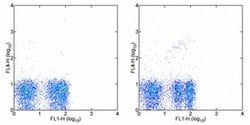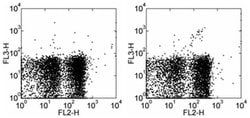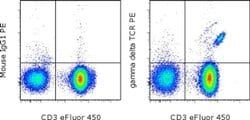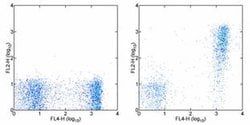50-119-04
TCR gamma/delta Monoclonal Antibody (eBioGL3 (GL-3, GL3)), Biotin, eBioscience™, Invitrogen™
Manufacturer: Fischer Scientific
Select a Size
| Pack Size | SKU | Availability | Price |
|---|---|---|---|
| Each of 1 | 50-119-04-Each-of-1 | In Stock | ₹ 20,737.00 |
50-119-04 - Each of 1
In Stock
Quantity
1
Base Price: ₹ 20,737.00
GST (18%): ₹ 3,732.66
Total Price: ₹ 24,469.66
Antigen
TCR gamma/delta
Classification
Monoclonal
Concentration
0.5 mg/mL
Formulation
PBS with 0.09% sodium azide; pH 7.2
Gene Accession No.
0
Gene Symbols
Tcrd, Tcrg
Purification Method
Affinity chromatography
Regulatory Status
RUO
Gene ID (Entrez)
110066, 110067
Content And Storage
4° C, store in dark, DO NOT FREEZE!
Form
Liquid
Applications
Flow Cytometry
Clone
eBioGL3 (GL-3, GL3), GL3)
Conjugate
Biotin
Gene
Tcrg
Gene Alias
RGD1311300; similar to T cell receptor V delta 6; T cell receptor gamma locus; T3/TCR complex; TCR delta gamma; TCR gamma/delta; TCR-CD3 complex; Tcrg; Trg; Trg@
Host Species
Armenian Hamster
Quantity
100 μg
Primary or Secondary
Primary
Target Species
Mouse
Product Type
Antibody
Isotype
IgG
Related Products
Description
- Description: The GL3 monoclonal antibody reacts with the gamma delta T-cell Receptor complex (TCR) on all gamma delta TCR bearing T cells, but it does not react with alpha beta TCR
- The gamma delta TCR is present on cells in the thymus, epidermis, epithelial lining of the intestine, peritoneal cavity, and lymphoid tissues
- Applications Reported: This GL3 (GL-3) antibody has been reported for use in flow cytometric analysis
- It is recommended to prestain cells with anti-mouse CD16/32 (cat
- 14-0161) to prevent non-specific Fc-mediated binding of the GL3 monoclonal antibody
- Applications Tested: This GL3 (GL-3) antibody has been tested by flow cytometric analysis of mouse lymph node cells
- This can be used at less than or equal to 0.25 μg per test
- A test is defined as the amount (μg) of antibody that will stain a cell sample in a final volume of 100 μL
- Cell number should be determined empirically but can range from 10^5 to 10^8 cells/test
- It is recommended that the antibody be carefully titrated for optimal performance in the assay of interest
- Filtration: 0.2 μm post-manufacturing filtered
- TCR gamma/delta (T-cell receptor gamma/delta) are specialized T-cells in the immune system
- The ability of T cell receptors (TCR) to discriminate foreign from self-peptides presented by major histocompatibility complex (MHC) class II molecules is essential for an effective adaptive immune response
- TCR recognition of self-peptides has been linked to autoimmune disease
- Mutant self-peptides have been associated with tumors
- Engagement of TCRs by a family of bacterial toxins know as superantigens has been responsible for toxic shock syndrome
- Autoantibodies to V beta segments of T cell receptors have been isolated from patients with rheumatoid arthritis (RA) and systemic lupus erythematosus (SLE)
- The autoantibodies block TH1-mediated inflammatory auto-destructive reactions and are believed to be a method by which the immune system compensates for disease
- Most human T cells express the TCR alpha-beta and either CD4 or CD8 molecule (single positive, SP)
- However, a small number of T cells lack both CD4 and CD8 (double negative, DN)
- Increased percentages of alpha-beta DN T cells have been identified in some autoimmune and immunodeficiency disorders
- Gamma-delta T cells are primarily found within the epithelium
- They show less TCR diversity and recognize antigens differently than alpha-beta T cells
- Subsets of gamma-delta T cells have shown antitumor and immunoregulatory activity.
Compare Similar Items
Show Difference
Antigen: TCR gamma/delta
Classification: Monoclonal
Concentration: 0.5 mg/mL
Formulation: PBS with 0.09% sodium azide; pH 7.2
Gene Accession No.: 0
Gene Symbols: Tcrd, Tcrg
Purification Method: Affinity chromatography
Regulatory Status: RUO
Gene ID (Entrez): 110066, 110067
Content And Storage: 4° C, store in dark, DO NOT FREEZE!
Form: Liquid
Applications: Flow Cytometry
Clone: eBioGL3 (GL-3, GL3), GL3)
Conjugate: Biotin
Gene: Tcrg
Gene Alias: RGD1311300; similar to T cell receptor V delta 6; T cell receptor gamma locus; T3/TCR complex; TCR delta gamma; TCR gamma/delta; TCR-CD3 complex; Tcrg; Trg; Trg@
Host Species: Armenian Hamster
Quantity: 100 μg
Primary or Secondary: Primary
Target Species: Mouse
Product Type: Antibody
Isotype: IgG
Antigen:
TCR gamma/delta
Classification:
Monoclonal
Concentration:
0.5 mg/mL
Formulation:
PBS with 0.09% sodium azide; pH 7.2
Gene Accession No.:
0
Gene Symbols:
Tcrd, Tcrg
Purification Method:
Affinity chromatography
Regulatory Status:
RUO
Gene ID (Entrez):
110066, 110067
Content And Storage:
4° C, store in dark, DO NOT FREEZE!
Form:
Liquid
Applications:
Flow Cytometry
Clone:
eBioGL3 (GL-3, GL3), GL3)
Conjugate:
Biotin
Gene:
Tcrg
Gene Alias:
RGD1311300; similar to T cell receptor V delta 6; T cell receptor gamma locus; T3/TCR complex; TCR delta gamma; TCR gamma/delta; TCR-CD3 complex; Tcrg; Trg; Trg@
Host Species:
Armenian Hamster
Quantity:
100 μg
Primary or Secondary:
Primary
Target Species:
Mouse
Product Type:
Antibody
Isotype:
IgG
Antigen: TCR gamma/delta
Classification: Monoclonal
Concentration: 0.5 mg/mL
Formulation: PBS with 0.09% sodium azide; pH 7.2
Gene Accession No.: 0
Gene Symbols: Tcrd, Tcrg
Purification Method: Affinity chromatography
Regulatory Status: RUO
Gene ID (Entrez): 110066, 110067
Content And Storage: 4° C, store in dark, DO NOT FREEZE!
Form: Liquid
Applications: Flow Cytometry
Clone: eBioGL3 (GL-3, GL3), GL3)
Conjugate: Biotin
Gene: Tcrd
Gene Alias: RGD1311300; similar to T cell receptor V delta 6; T cell receptor gamma locus; T3/TCR complex; TCR delta gamma; TCR gamma/delta; TCR-CD3 complex; Tcrg; Trg; Trg@
Host Species: Armenian Hamster
Quantity: 500 μg
Primary or Secondary: Primary
Target Species: Mouse
Product Type: Antibody
Isotype: IgG
Antigen:
TCR gamma/delta
Classification:
Monoclonal
Concentration:
0.5 mg/mL
Formulation:
PBS with 0.09% sodium azide; pH 7.2
Gene Accession No.:
0
Gene Symbols:
Tcrd, Tcrg
Purification Method:
Affinity chromatography
Regulatory Status:
RUO
Gene ID (Entrez):
110066, 110067
Content And Storage:
4° C, store in dark, DO NOT FREEZE!
Form:
Liquid
Applications:
Flow Cytometry
Clone:
eBioGL3 (GL-3, GL3), GL3)
Conjugate:
Biotin
Gene:
Tcrd
Gene Alias:
RGD1311300; similar to T cell receptor V delta 6; T cell receptor gamma locus; T3/TCR complex; TCR delta gamma; TCR gamma/delta; TCR-CD3 complex; Tcrg; Trg; Trg@
Host Species:
Armenian Hamster
Quantity:
500 μg
Primary or Secondary:
Primary
Target Species:
Mouse
Product Type:
Antibody
Isotype:
IgG
Antigen: Ea52-68 peptide bound to I-Ab
Classification: Monoclonal
Concentration: 0.5 mg/mL
Formulation: PBS with 0.09% sodium azide; pH 7.2
Gene Accession No.: P01921, P06342, P06343, P06344, P06345, P06346, P14483
Gene Symbols: H2-Ab1
Purification Method: Affinity chromatography
Regulatory Status: RUO
Gene ID (Entrez): 14961
Content And Storage: 4° C, store in dark, DO NOT FREEZE!
Form: Liquid
Applications: Flow Cytometry
Clone: eBioY-Ae (YAe, Y-Ae), Y-Ae)
Conjugate: Biotin
Gene: H2-Ab1
Gene Alias: Abeta; AI845868; H-2 class II histocompatibility antigen, A beta chain; H-2Ab; H2-Ab; H2-Ab1; H2Eb; H-2Eb; H2-iabeta; histocompatibility 2, class II antigen A, beta 1; Ia2; Ia-2; Ia4; Ia-4; IAb; I-Abeta; major histocompatibility complex class II beta chain; MGC163794; MGC163796; MHC class II antigen A beta; MHC class II H2-IA-beta-psi; response to metastatic cancers 1; Rmcs1
Host Species: Mouse
Quantity: 50 μg
Primary or Secondary: Primary
Target Species: Mouse
Product Type: Antibody
Isotype: IgG2b
Antigen:
Ea52-68 peptide bound to I-Ab
Classification:
Monoclonal
Concentration:
0.5 mg/mL
Formulation:
PBS with 0.09% sodium azide; pH 7.2
Gene Accession No.:
P01921, P06342, P06343, P06344, P06345, P06346, P14483
Gene Symbols:
H2-Ab1
Purification Method:
Affinity chromatography
Regulatory Status:
RUO
Gene ID (Entrez):
14961
Content And Storage:
4° C, store in dark, DO NOT FREEZE!
Form:
Liquid
Applications:
Flow Cytometry
Clone:
eBioY-Ae (YAe, Y-Ae), Y-Ae)
Conjugate:
Biotin
Gene:
H2-Ab1
Gene Alias:
Abeta; AI845868; H-2 class II histocompatibility antigen, A beta chain; H-2Ab; H2-Ab; H2-Ab1; H2Eb; H-2Eb; H2-iabeta; histocompatibility 2, class II antigen A, beta 1; Ia2; Ia-2; Ia4; Ia-4; IAb; I-Abeta; major histocompatibility complex class II beta chain; MGC163794; MGC163796; MHC class II antigen A beta; MHC class II H2-IA-beta-psi; response to metastatic cancers 1; Rmcs1
Host Species:
Mouse
Quantity:
50 μg
Primary or Secondary:
Primary
Target Species:
Mouse
Product Type:
Antibody
Isotype:
IgG2b
Antigen: Ea52-68 peptide bound to I-Ab
Classification: Monoclonal
Concentration: 0.5 mg/mL
Formulation: PBS with 0.09% sodium azide; pH 7.2
Gene Accession No.: P01921, P06342, P06343, P06344, P06345, P06346, P14483
Gene Symbols: H2-Ab1
Purification Method: Affinity chromatography
Regulatory Status: RUO
Gene ID (Entrez): 14961
Content And Storage: 4° C, store in dark, DO NOT FREEZE!
Form: Liquid
Applications: Flow Cytometry
Clone: eBioY-Ae (YAe, Y-Ae), Y-Ae)
Conjugate: Biotin
Gene: H2-Ab1
Gene Alias: Abeta; AI845868; H-2 class II histocompatibility antigen, A beta chain; H-2Ab; H2-Ab; H2-Ab1; H2Eb; H-2Eb; H2-iabeta; histocompatibility 2, class II antigen A, beta 1; Ia2; Ia-2; Ia4; Ia-4; IAb; I-Abeta; major histocompatibility complex class II beta chain; MGC163794; MGC163796; MHC class II antigen A beta; MHC class II H2-IA-beta-psi; response to metastatic cancers 1; Rmcs1
Host Species: Mouse
Quantity: 100 μg
Primary or Secondary: Primary
Target Species: Mouse
Product Type: Antibody
Isotype: IgG2b
Antigen:
Ea52-68 peptide bound to I-Ab
Classification:
Monoclonal
Concentration:
0.5 mg/mL
Formulation:
PBS with 0.09% sodium azide; pH 7.2
Gene Accession No.:
P01921, P06342, P06343, P06344, P06345, P06346, P14483
Gene Symbols:
H2-Ab1
Purification Method:
Affinity chromatography
Regulatory Status:
RUO
Gene ID (Entrez):
14961
Content And Storage:
4° C, store in dark, DO NOT FREEZE!
Form:
Liquid
Applications:
Flow Cytometry
Clone:
eBioY-Ae (YAe, Y-Ae), Y-Ae)
Conjugate:
Biotin
Gene:
H2-Ab1
Gene Alias:
Abeta; AI845868; H-2 class II histocompatibility antigen, A beta chain; H-2Ab; H2-Ab; H2-Ab1; H2Eb; H-2Eb; H2-iabeta; histocompatibility 2, class II antigen A, beta 1; Ia2; Ia-2; Ia4; Ia-4; IAb; I-Abeta; major histocompatibility complex class II beta chain; MGC163794; MGC163796; MHC class II antigen A beta; MHC class II H2-IA-beta-psi; response to metastatic cancers 1; Rmcs1
Host Species:
Mouse
Quantity:
100 μg
Primary or Secondary:
Primary
Target Species:
Mouse
Product Type:
Antibody
Isotype:
IgG2b





